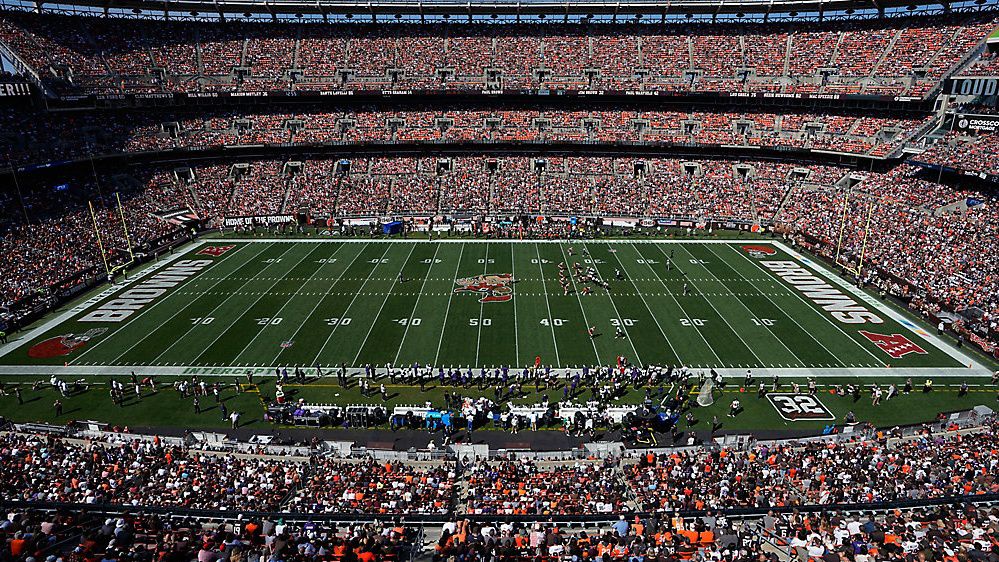CLEVELAND — Mayor Justin Bibb and other city leaders said Cleveland Browns Stadium is more than a venue but a vital part of downtown's success, regional health and the city's global image.
The Browns have played on the shores of Lake Erie since their inception in 1946.
Their new stadium was built in 1999 when they returned as an expansion franchise. While it has been upgraded, there are major traffic issues and a parking shortage due to its lakefront location.
For more than 10 years, $7.5 billion has been invested into downtown Cleveland with opportunity to build on many public investments including Progressive Field, Rocket Mortgage Fieldhouse, the Hilton Hotel and the Huntington Convention Center.
“We are implementing a bold vision for lakefront development, and the Browns have been an essential fixture on our lakefront for decades. But our first priority is always our residents,” stated Bibb in a news release. “Having the Browns play here is integral to our city’s identity and community spirit. This initiative must go beyond the Browns and be about what’s best for downtown, the neighborhoods, the suburbs, and the region.”
In the release, officials said there are also opportunities to build on private investments including the new Sherwin-Williams headquarters, the Rock and Roll Hall of Fame expansion and the Flats East Bank.
“Losing the Browns would harm Cleveland and all Clevelanders,” Bibb added. “Lower spending downtown would negatively affect tax revenues that provide essential services for a city in need. It would close businesses, cost jobs, empty out storefronts, and make our downtown feel less alive.” he added. “We also can’t lose sight of how a new venue would cost taxpayers—including Clevelanders—hundreds of millions more while undermining the city and region's other critical needs. A strong urban core drives success for the entire region.”
The mayor sent a letter to the Haslam Sports Group addressing Jimmy and Dee Haslam, owners of the Cleveland Browns.
“We are unified in our belief that transforming the current facility is unquestionably in the best interests of Cleveland and Cuyahoga County," Bibb said in his letter. "We do not believe any public financial support should responsibly be made available for development of a stadium outside of the City of Cleveland.”
Bibb said the city was committed to a competitive lease arrangement on Lake Erie for the next 30 years. In the letter, Bibb said the deal would provide a "dramatically upgraded facility that will serve both the Browns and Greater Cleveland for decades." According to his letter, the package does not tap into team revenue sources and protects the city's budget.
According to a project summary, the Haslam Sports Group will design the stadium project with city approval. The cost of the project is expected to come in at $1 billion.
"Collaboration among stakeholders is crucial for funding, requiring private investment, new revenue sources and government support," Bibb's letter continues. "The city commits $367 million for the Stadium Project and $94 million for capital repairs form parking revenue."
The letter says $20 million of funding will be available after lease execution from existing stadium capital reserves. The balance of funding will be provided annually as through admissions tax, sin tax and sum as seen in the summary document.
"The funding model ensures that fans paying for tickets cover the cost of upgrades without negatively impacting the city budget," the city said in a news release. "Cleveland is committed to using revenues that would not exist but for this project. This approach assures equity, given that 70% of the stadium’s users come from outside of Cuyahoga County."
The lease term is for 30 years, with a five-year extension at HSG's option.
HSG will also pay rent equal to property tax and property insurance, about $1.3 million per year.
“We have worked closely with the Haslam Sports Group over many months and developed a competitive, thoughtful, and comprehensive package that we believe respects taxpayers and protects the city’s budget while enhancing the Browns’ fan experience,” noted Mayor Bibb.
Cleveland City Council received the package, releasing a statement that it will review and discuss the proposal at a later date.
"Keeping the Browns' stadium in the heart of our central business district is not just a matter of sports; it's about economic growth and community pride. A downtown stadium supports local businesses, stimulates job creation and enhances our city's vibrancy," said Council President Blaine A. Griffin in a news release. "The Browns' presence contributes to Cleveland's cultural fabric, attracting visitors and residents alike to our downtown."
The leadership team asked for the Browns organization to engage in discussions with city leaders and stakeholders. Downton Cleveland Inc. joined city officials in keeping the stadium downtown.
"Together, we can ensure that the Cleveland Browns remain a proud part of our city's identity and contribute to the growth and prosperity of Cleveland and Northeast Ohio," the council's release said.
Haslam Sports Group issued a statement in response to the proposal, saying they would be following up with the city to understand the details of the plan while it is reviewed.
"As we have said consistently throughout this process, we continue to communicate and collaborate with the cities of Cleveland and Brook Park, Cuyahoga County, and the State of Ohio on a long-term stadium solution that creates a world-class experience for our fans and positively impacts Northeast Ohio.," said Dave Jenkins, Haslam Sports Group chief operating officer. "We are working diligently to comprehensively examine all options to identify the best path for not only our fans, but also Greater Cleveland and Northeast Ohio."
Jenkin said in the statement it was vital to create the best experience for fans while creating a, "long-term, sustainable stadium solution."
The Associated Press contributed to this report.



